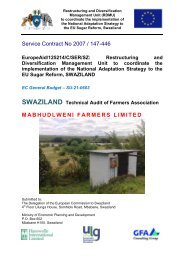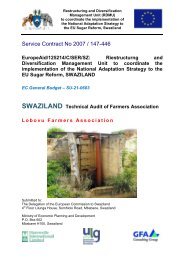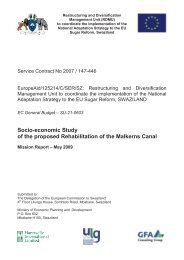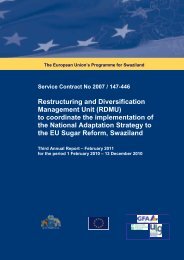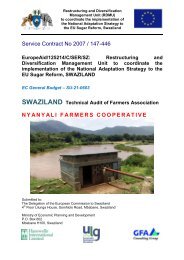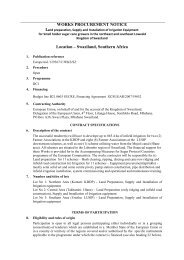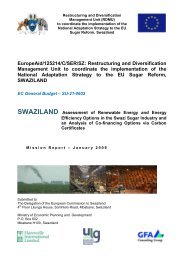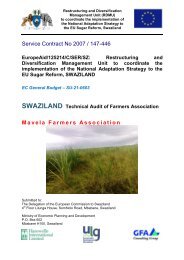Service Contract No 2007 / 147-446 Strategic ... - Swaziland
Service Contract No 2007 / 147-446 Strategic ... - Swaziland
Service Contract No 2007 / 147-446 Strategic ... - Swaziland
- No tags were found...
Create successful ePaper yourself
Turn your PDF publications into a flip-book with our unique Google optimized e-Paper software.
2.2 The <strong>Swaziland</strong> National Adaptation Strategy(NAS)The National Adaptation Strategy (NAS) is aimed at tackling the impacts expected from theEU sugar reforms, but also addresses existing concerns in the sector. These are approachedby the identification of measures to mitigate and minimise impacts, and make best use ofexisting opportunities. The NAS provides an analysis and overview of the expected socioeconomicimpact of the EU reforms, which is the basis for the development of “strategymeasures for national adaptation”.General impacts expected on the sector from the sugar reforms include: reducedgovernment revenues from sugar levies; reduced competitiveness of the sugar companies;reduced income and financial viability of smallholders and commercial farmers, including riskof existing irrigation schemes LUSIP and KDDP; increased vulnerability of smallholders; lossof jobs in the sugar sector; and reduction of social services provided by the sugarcompanies, amongst others.The NAS is divided into eight areas, under which 60 measures are proposed. The NASstructure and proposed measures are described in Annex 1. The eight areas of developmentare:1. Competitiveness of the sugar industry2. Trade policy and the pursuit of premium markets3. Promoting productivity and efficiency in smallholder cane growing4. Diversification within and outside the sugar industry5. Social services, welfare and labour issues6. Mitigating impact on the government’s fiscal position7. Enhancing a sustainable socio-economic environment and cross-cutting issues8. Institutional structures for implementationThese areas cover a broad range of issues dealing with various sectors, such as trade,energy, infrastructure, social services, land tenure, health, education, environmentalmanagement, etc. Implementation of the NAS is coordinated by a NAS Steering Committeewith inter-sectoral representation, and financing is expected from various sources, includingdonors, government and industry. The responses foreseen include measures to improve thecompetitiveness and productivity of the sector, minimise costs, guarantee social services,reduce vulnerability of smallholders, make best use of existing market opportunities, promotediversification into sugar- and non-sugar products, and overall improve the performance ofthe sector.The NAS Steering Committee is chaired by the Ministry of Economic Planning andDevelopment (MEPD), and has representation from the following institutions andstakeholders: RDMU; SWADE; sugar mills; <strong>Swaziland</strong> Agricultural and Plantation WorkersUnion (SAPWU); the <strong>Swaziland</strong> Cane Growers Association; EC; <strong>Swaziland</strong> SugarAssociation (SSA); Ministry of Natural Resources and Energy; and Ministry of Agriculture(MOA).The 60 NAS measures consist more of a long-list of desired actions; mainly those reflectingthe sugar industry’s perceived needs (based on the Sugar Industry Strategy - SIS), plusthose added by the Government. There are a series of aspects that prevent the NAS frombeing a user-friendly document, and difficult to work within the context of this study: actionsare not prioritised; some “actions” are ambiguously worded and could be interpreted indifferent ways; one of the main sources of funding is the EC, with some components that areRDMU (<strong>Strategic</strong> Environmental Assessment of the National Adaptation Strategy) - Page 14



